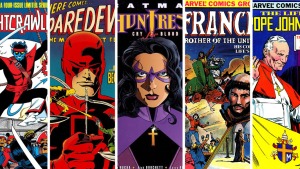In “Paper Girls” there are no traces of religion or spirituality, but the series shows the need for all of us to have something more than what we can discover for ourselves
They say that if you get far enough you can eventually meet yourself. The new Amazon Prime series Paper Girls he takes all of this literally. While openly science fiction, she takes us on an introspective, heart-focused journey and challenges us to imagine what would happen if our child and adult selves met.
In the early morning hours of All Saints’ Day, 1988, four 12-year-old girls set off on bicycles to deliver the newspapers. Even though they all live in the same small suburb, their lives are very different from each other.
Erin (Riley Lai Nelet) is the eldest daughter of a Chinese immigrant and carries the burden of acting as an interpreter for her mother. Tiffany (Camryn Jones) is a smart girl from a multiracial couple. Mac (Sofia Rosinsky) and KJ (Finna Strazza) both have difficult family situations, even though Mac’s experience is marked by abuse and neglect, while KJ grew up in a golden cage, trapped by her mother’s impossible expectations. In a normal situation, it would have been difficult for these girls to become friends, but as they deliver newspapers along the same route they find themselves casually joined in a plot involving time travel, a war for the fate of humanity and ordinary hardships. of growing up.
The series is based on the excellent comic of the same name by Brian K. Vaughan and Cliff Chiang, and is in many ways faithful to the original. The personalities of the characters, the emphasis on friendship in the face of adversity, and even the color scheme make it seem like the comic has come to life. What stands out most, however, is the interaction between the girls and their future selves, which also occurs in the comic but is not explored as thoroughly.
The girls find that their adult life is not what they had hoped for or expected, and this leads to tension and arguments. “You are literally the worst version of me I could ever imagine,” 12-year-old Erin tells her 40-year-old counterpart of hers. “Maybe you think you know what you want, but the truth is, you don’t even know who you are,” replies adult Erin. “You are a 12 year old girl. I have DVDs that are older than you ”.
This could easily lead to a moralizing or simply generational war, but the series wisely avoids dry answers. In interactions, and especially in conflicts, it is easy to see the point of view of both the adult and the child.
For example, the little girl Tiffany initially gets excited about having met hers alter ego 23-year-old, a smart and popular party girl who made her younger self’s dreams come true by graduating from top-class high school and going to MIT. Soon, however, her admiration turns to disappointment as Tiffany realizes that her adult self is stuck in her old town of hers, she does nothing constructive in her life and is apparently hostile towards others. dreams she once had.

The 12-year-old Tiffany is right to berate her adult self for her loss of ambition, reminding her “These are my dreams, nobody else’s.” At the same time, however, the grown-up Tiffany is telling the truth her younger self needs to hear when she states, “Right now you think success will make you whole, it will make you feel different, but I’m here to tell you that when there you will arrive you will be only yourself “. Each is holding up a mirror that the other desperately needs to see.
Throughout human history, we have always struggled with understanding ourselves. In the modern era, when identity has turned into a buzzword, we seem more confused than ever about how to find the meaning and purpose of our life. “What am I without you, if it does not lead of myself to the abyss?” says St. Augustine in his Confessions.
It is God who makes us intelligible to ourselves. In communion with Him, we begin to see who we really are and how the various parts of our life, even the broken and disordered ones that we don’t like to face, relate to a greater existence.

In Paper Girls there is no trace of religion or spirituality, but the complex web of interactions between girls and their adult counterparts indicates the need we all have to have more than anyone can discover for themselves. No version of ourselves, at any given moment, is capable of understanding everything we were created for. Only God, who sees us not taking into account the limits of time but as complete persons, can fully understand us.
Although it is a series about children, Catholic parents should be cautious when allowing their children to watch it, both because of the large amount of inappropriate words and because of the exploration of certain themes surrounding sexuality (even if there are none). nude scenes). For adults, however, it is an interesting series with many elements to explore, remembering that you cannot ignore who you have been and expect to find out who you can become.
“Paper Girls” brings comics to life and could help us face ourselves

